English releases of Otoyomegatari tend to be more a day at the beach than a river = rather than flow, they come in waves. That can make blogging the series a little challenging, as I rarely have the forward momentum to give the same depth of analysis to a chapter two days after I finished writing about the last. Still, I’m grateful to have the releases – they’re all I have to tide me over until (he said optimistically) we get our anime adaptation.
All in all this is a relatively quiet outing in any event, basically recounting the last week before Smith and company set off on their long and dangerous journey. That means Henry trying to get the hang of Collodion photography (with some success), securing additional camels (and exchanging the irritable ones) and supplies, and generally taking stock. More than once Henry reflects on how lucky he is to have Ali at this side, and he’s right – the Englishman would have never made it this far without his young friend. Ali is so industrious that even when Smith offers him a day off to rest up, he spends it doing odd jobs around town to score a few extra coins.
Hawking is a pessimist to say the least (though he prefers “realist”) when it comes to Henry’s plans, referring to the final week as “one last week to remember you by”. He also tells Henry that Niklovski has never accepted a penny for his services to Hawking – a debt, he says, for saving his life in the Crimean war. Hawking has more or less decided to make good on his karmic debt by giving Niklovski his estate when he bugs out and goes home, quite generous and clever. I had assumed with the name “Niklovski” that the man was Russian, but it’s kind of implied here that he’s a local, and he dresses like one, so I’m not sure just what his origins are. In any event he suggests that he accompany Smith as far as Tehran, to make use of his many connections to help smooth the journey. And who is Henry to say no to an offer like that?
Indeed one might say that an irrational percentage of the characters in Otoyomegatari are, like Nikovski, unnaturally kind and generous – I don’t know what things were really like at this time and place, but Smith’s journey certainly is littered with noble souls. One of those is certainly Talas, who’s spent the last week holed up in her room – in point of fact, quietly knitting (gorgeous) embroideries for Smith to trade for supplies at market. As odd a pair as they seem on the surface, I think she and Henry are actually a perfect match – which, what do you know, is a recurring them in A Bride’s Story. Maybe the recurring theme…


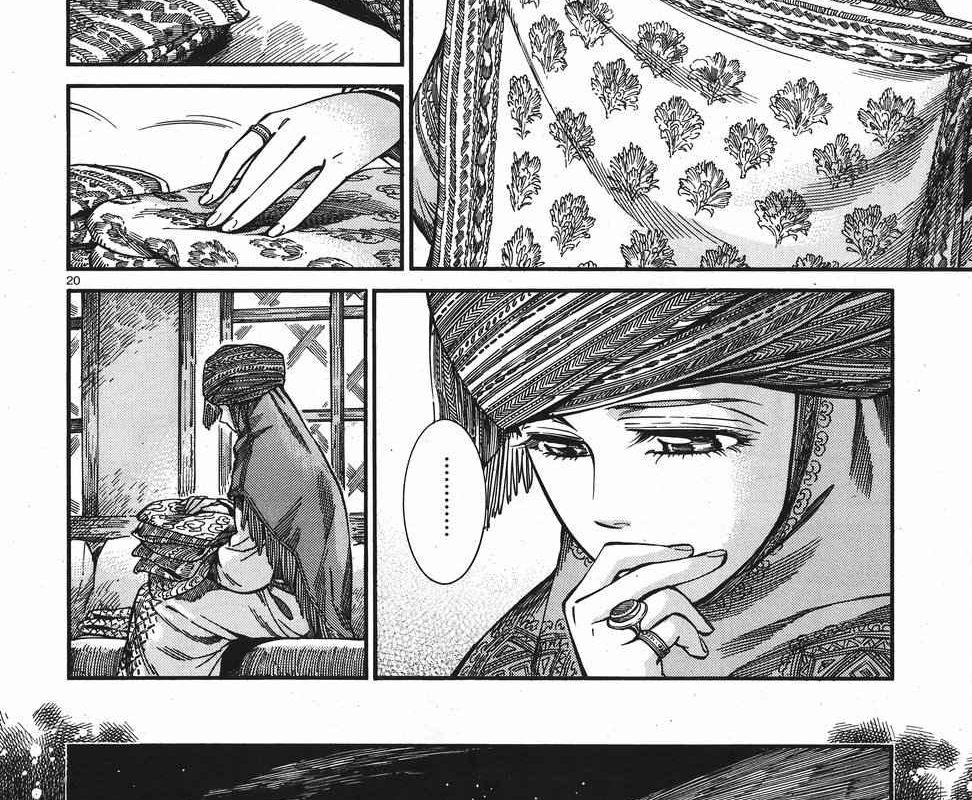
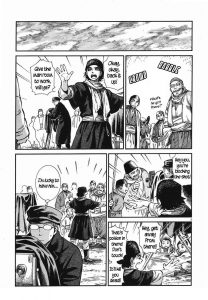
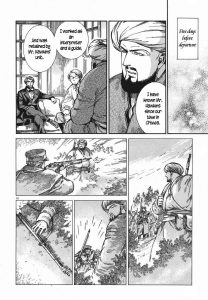
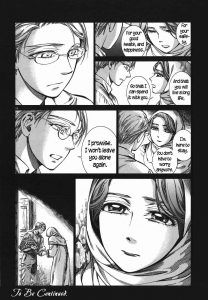
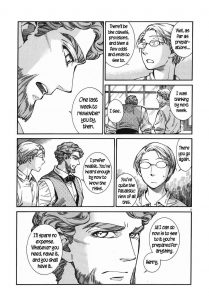
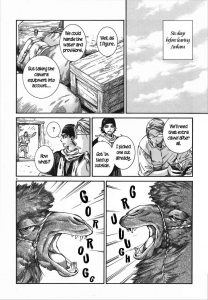
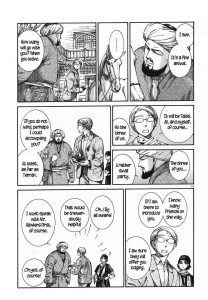
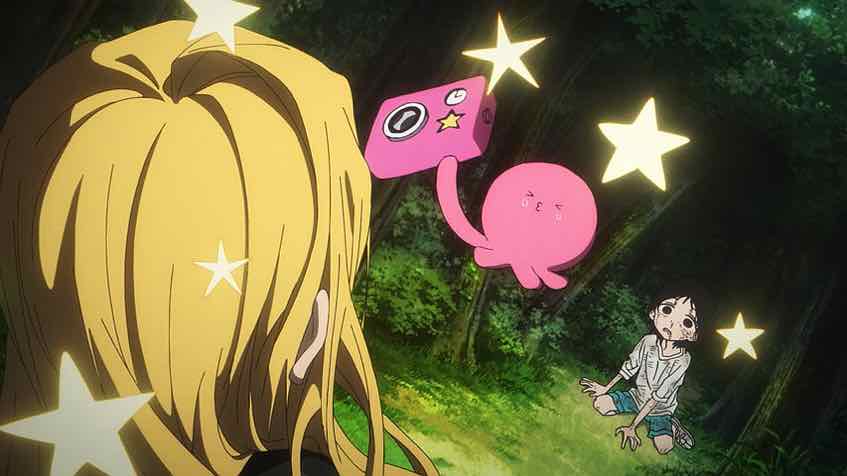

Panino Manino
August 12, 2018 at 7:45 am” I don’t know what things were really like at this time and place, but Smith’s journey certainly is littered with noble souls”
I have the feeling that I heard about this… about some sort of “hospitable tradition” on the region, the thing that allows Henry to become a temporary member of someone strange house. I can’t imagine how much of the persian heritage still exist there, but the persian hadn’t this “festive” tradition? Socialize by way of drinking and eating? Anyway, I do wonder when “winter will come”, because while we can’t expect to see any of the character dying, or being separated, it’s certain that they’ll have to overcome various and dangerous obstacles (like Karluk and Amira did).
Guardian Enzo
August 12, 2018 at 7:51 amYes, in this part of there the world definitely exists the hospitality imperative – guests are to be welcomed, even if enemies, and as far as I know it’s still at least somewhat relevant today.
The thing with Otoyomegatari, though, is a lot of what we see goes beyond a cultural requirement – stuff like Talas’ husband and Niklovski here, and the extraordinary lengths Karluk’s village went to for Henry Smith.
Stefan
August 12, 2018 at 9:00 amIt seems to me there’s a proportional relationship between skin in the game and nobility of soul.
Guardian Enzo
August 12, 2018 at 4:24 pmHow so? We’ve met very few Euros so far but the ones we have (Smith, Niklovski, Hawking etc.) all seem a decent sort.
Stefan
August 12, 2018 at 4:45 pmThey put their skin in the game being there. These are not the usual Brits one might meet in Emma. They are resilient to many walks of life, and do not take their own social conventions for granted. Life in this place and era was very personal and visceral, down-to-earth, compared with other “more civilised places” which revel in elaborate social etiquette.
In short, by meeting all kinds of people and seeing all kinds of things, they’re good at handling ambiguity. They’re more self-owned. Smith seems undoubtedly airheaded, but do not forget your own experience of being subverted by the Japanese culture; he’s stretching his curiosity and allowing his expectations to be subverted and puts himself at risk to capture the various ways of life. Hawking is more embedded into the British society, but after a necessary scolding he does not have any sort of malice against Smith & Talas. Niklovski is obviously committed to his convictions. In other words, they’re all risk-takers.
People who take risks for other people have a nobility of soul. Think All Might etc. I don’t think Otoyomegatari displays an irrational percentage of good people; I think it perfectly suits this context in that era.
Guardian Enzo
August 12, 2018 at 4:55 pmAh, now I get what you mean. Yeah, that’s a valid point – we are seeing the best of the European world in terms of felxibility and open-mindedness.
Honestly, though, I was referring more to the local people. It goes ways beyond the hospitality imperative – so many of these people are practically saint-like. Even Ali, in his rough way, is ridiculously noble and capable.
Stefan
August 13, 2018 at 7:07 amI don’t know about all that. The Silk Road was full of merchants that had to interact with wildly different kinds of people face-to-face. That’s diametrically opposed to today’s internet, where people stay in their niches behind a screen taking no risk at all by interacting with human nature. I can’t quite disentangle cultural bias from facts, so I don’t know if the thing about locals is inacurrate.
Panino Manino
August 12, 2018 at 6:13 pm“stuff like Talas’ husband”
Yeah, that. I really hated when that happened, it was a bit too far and hard to believe. But Mori did that, put Talas on Smith’s plate for free, and there’s no coming back now.
Guardian Enzo
August 12, 2018 at 9:42 pmDon’t get me wrong – I don’t think Mori is engaging in the noble savage trope or anything. But maybe she is idealizing the exotic foreigners just a bit.
Aya
August 17, 2018 at 3:00 amPersonally I always feel the story is too idealistic at times. Like the chapter about the young girl asking her husband to marry another woman. Stuff like that would be very complicated in real life. Even though I like the art and loves the story, I hope the author would put more…color into her cast. Everyone seems to be the same kind and noble soul.
Guardian Enzo
August 17, 2018 at 5:50 amExcept Amir’s daddy, of course.
Stefan
September 25, 2018 at 5:02 amI’ve just thought about it, but does Talas’ name reference the Battle of Talas, and if so, is that significant in any way?
Guardian Enzo
September 25, 2018 at 6:22 amI’m struggling to draw a connection there, given the specifics of that event.